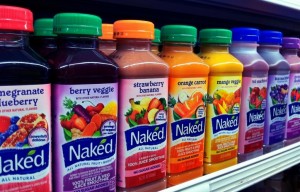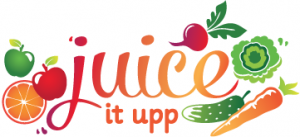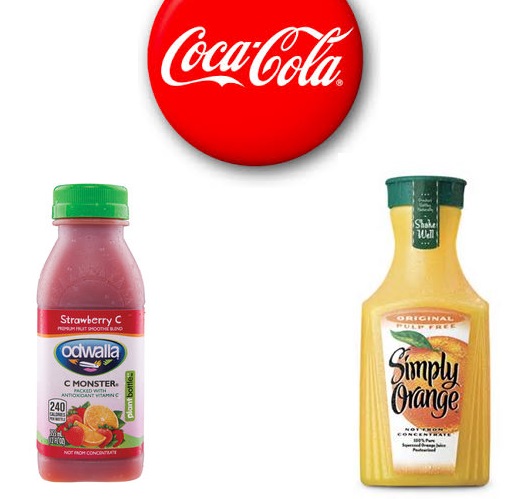If you have ever bought Coca-Cola’s “Simply Orange” or “Odwalla” juice brands, you’ve probably fallen for their marketing campaign that targets people looking for healthy products.
Both of these seemingly natural brands, Simple Orange and Odwalla, are owned by Coca-Cola and you’d be surprised at how unnatural the products are—just as you’d expect from the company that created Classic Coke. Jim Horrisberger, a director of one of Simply Orange’s juice packaging plants says “You take Mother Nature and standardize it…” At these plants they have a computer that calculates the taste and modifies the juice to keep a consistent taste. That’s why all Simply Orange juices taste identical from bottle to bottle. (You’ll notice that if you juice oranges at home, the flavor varies from produce to produce). Odwalla also uses Genetically Modified Organisms (GMO) in their juice, you can tell because the owners, Coca-Cola, paid $1,700,000 to STOP GMO labeling in California (campaign no on Prop 37).
Coca-Cola’s Black Book
No, Simply Orange oranges are not picked by farmers, rather they are extracted from trees by a computerized machine. Then the computer changes the resulting blend using Coca-Cola’s top-secret, confidential methodology called the Black Book to maintain a consistent taste from bottle to bottle (Why is it secret? Take a guess). The Black Book method is how Coke creates “perfect” orange juice 12 months a year, even though the peak season for oranges lasts only 3 months. We don’t know everything the process involves.
The secret is the application of an algorithm that makes your juice have the “exact right taste” in a similar fashion that Google gives you search results—an algorithm. The architect of this mathematical formula is Bob Cross and he said that Orange juice “is definitely one of the most complex applications of business analytics….It requires analyzing… to consistently deliver the optimal blend, despite the whims of Mother Nature.”
The Black Book deals with 600 different flavors that make up an orange and give or take some of them depending on where it is being shipped. If it is going to a South American country, they change the blend with the computer because people prefer their juice a specific way depending on their region. In the North American market most orange juice has high levels of a chemical called Ethyl Butyrate because that is what big companies have found that Americans like most about orange juice—it is artificially added.
Consumers kept in the dark
We didn’t know this because Coca-Cola has kept it all under wraps. That is, until Bloomberg Business interviewed Simply Orange employees and revealed the truth. But still, there are waves of consumers buying Simply Orange and Minute Maid and believe them to be natural.
Why would Coca-Cola do this? Because Americans will pay more money for juice they believe to be fresher. According to a 2010 report by the University of Florida Institute of Food and Agricultural Sciences Extension, Americans will pay $1 to $2 more per gallon for juice that they believe to be more fresh. So they have created another process to make the juice SEEM fresh, even though it was squeezed one year earlier. What happens is that the orange juice is deprived of its oxygen (and flavor) so it doesn’t rot. Then when it is ready to be put on the shelves the orange juice flavor and smell is replenished by “flavor packs” created by Givaudan; Firmenich; and International Flavors and Fragrances three companies that also make perfumes for Dior, Calvin Klein, Justin Bieber and Taylor Swift. They know how to engineer the smells of anything, even oranges. So your orange juice will smell fresh even though the oranges can be up to one year old. These flavor packs are also not included in the ingredients list because they are derived somehow from orange essence and oil, therefore it passes FDA guidelines to not be another ingredient on the label. (If you want to get truly natural juice, I suggest investing in a slow juicer)
Fungicide found in Orange Juice
Fungicides are chemical pesticides used to slow the growth of or kill fungi. Most of them are toxic to people and can cause short and long term problems if absorbed into food and ingested. In 2012, Atlanta-based Coca-Cola, which makes Simply Orange and Minute Maid orange juice, said it notified the FDA of the fungicide carbendazim in the company’s orange juice and in competitors’ juice. At first the FDA made a statement that an “unnamed company” said there was fungicide in their orange juice—a week later the FDA let the public know that the unnamed company was indeed Coca-Cola.
The FDA supported Coca-Cola in this matter. The FDA did not ask for any orange juice to be recalled from the shelves. FDA Spokeswoman Siobhan Delancey said that fungicide below 10 parts per billion is not measurable so it would be allowed (Even though any amount of the substance in juice is illegal because fungicide is not approved for use in the US).
What is even worse is that companies that sell orange juice in the US import oranges from Brazil during orange off-season even though fungicide is used liberally in Brazil. 1 out of every 6 glasses of orange juice contains orange juice from Brazil, even the reputable company Florida’s Natural imports Brazilian concentrate for its “From Concentrate” juice.
The question that comes to mind is: “Is the FDA really there to protect consumers when they let errors like this go with little to no consequence?” and “What other chemicals are in our processed juices that we don’t know about?”
What “Not From Concentrate” Means
Tropicana made up the term “not from concentrate” In the 80s as a positioning marketing move to put their pasteurized OJ above the cheaper “from concentrate” juice. But the “not from concentrate” pasteurized juice is not more expensive because it is more fresh, it is more expensive only because of the storage space of keeping it around for months! Both of these methods use aseptic storage after de-oxygenizing juice in a process known as “deaeration” which takes away any taste that resembles an orange (to be added later with flavor packs). The bottom line is that “Not From Concentrate” was created as a marketing term and does not mean that the juice is more fresh.
The term was created to convince consumers that pasteurized OJ is fresher, better and is worth more money. It worked. Over the 5 years after creating the term, Tropicana’s juice sales doubled and profits almost tripled.
More deceivingly “natural” brands
 PepsiCo makes Tropicana, Naked Juice, Dole, Ocean Spray, Izze and many more.
PepsiCo makes Tropicana, Naked Juice, Dole, Ocean Spray, Izze and many more.
Smuckers makes Santa Cruz Organic.
Kellogg’s makes Kashi cereals which contains GMO.
Clorox makes Burt’s Bees.
Colgate-Palmolive makes Tom’s of Maine.
(Image Source: www.liebenfels.com )
How to get real fresh orange juice
The best way to know you are going to get real fresh orange juice is to get a citrus juicer and juice it yourself. You can also go to a juice bar, farmers market or other location where you watch the oranges being squeezed. Otherwise, you may have an orange juice that is heavily processed and was juiced 6 months before.
Sources:
Squeezed: What You Don’t Know About Orange Juice by Alissa Hamilton
www.civileats.com
www.cooksillustrated.com
www.businessweek.com
www.csmonitor.com



It’s been almost a year since I last drank coca-cola. Living healthy now!
Aras Androck recently posted…couponhuntr.com
The recent bottle of simply orange juice I tried recently dated expiration December 2014 was disgusting tasting. It tasted like battery acid and vinegar water.